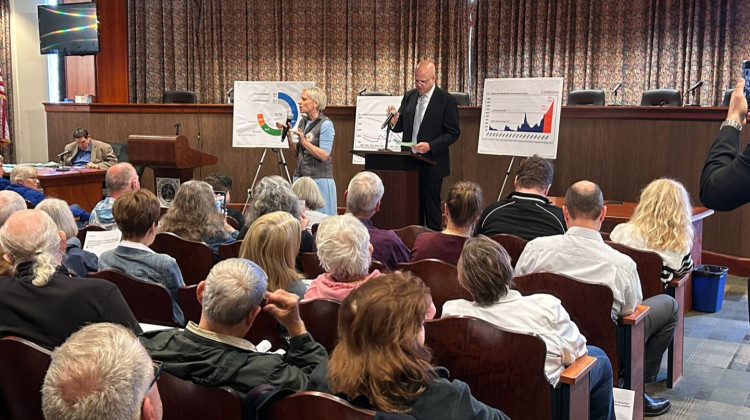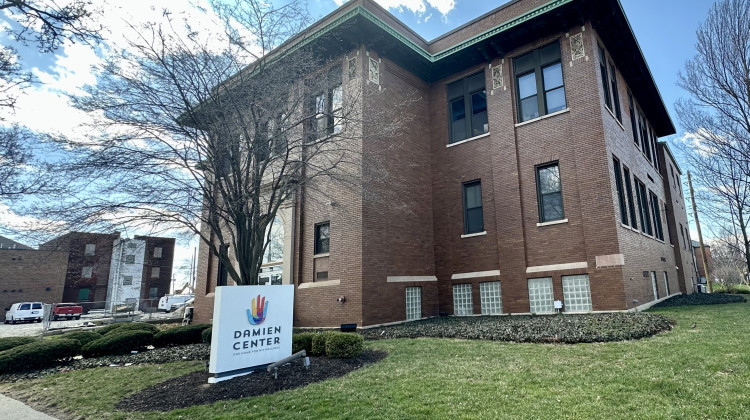It’s a Thursday, not a Sunday, but the First Baptist Church in East Chicago is open for business. The president of the state’s NAACP is hauling in large cardboard boxes of nectarines. The fruit is placed beside milk crates full of cucumbers and apples. The effect is similar to a booth at a farmer’s market, except the produce doesn’t have prices on it. It’s here for the taking.
The spread is part of a community effort organized by the NAACP. The vitamins found in fresh produce protect people from some of the harmful health effects of lead.
Douglas Sloss is First Baptist Church’s pastor. He points through the church’s window at the West Calumet Housing Complex, about a hundred yards away. Many West Calumet residents are members of the church, which has been in the community for more than 100 years.
The complex is also where about a third of the affected people in the Environmental Protection Agency’s Superfund clean-up site live. In a few months, the homes in this area are scheduled to be bulldozed.
And Sloss says housing is only one source of stress and fear.
“A lot of people that used to live there are now coming back and saying ‘I’ve had those symptom for years, and I don’t know if it can medically be proven,’” he says. “But they believe it’s because ‘hey I lived there for 20 years and that’s why I’m now dealing with those health issues.’”
The worried people at First Baptist have a point according to Purdue professor Ellen Wells, who specializes in lead exposure’s effects on health, the exact health problems associated with lead are hard to pin down.
“In any individual, it’s almost impossible to make that connection, because all these conditions have many underlying factors too,” says Wells.
For example, lead is correlated with cardiac problems, but in these cases, there are other socioeconomic factors present in East Chicago — such as poverty and lack of access to healthy food — playing similar detrimental roles.
Lead contamination is the most serious in young children. Because they’re still growing, lead is more easily absorbed into their bodies which can delay neurological functions and cause learning and behavioral problems.
“When a child is exposed to lead, it can affect the way the whole structure is set up,” says Wells. “As opposed to in an adult, where it affects the functioning of the already-established nervous system.”
The West Calumet Housing Complex itself contains blocks of neat brown houses with tidy green lawns. A big water tower looms just beyond the complex’s fences, emblazoned with the words “For our children: East Chicago.”
On the back stoop of one of the houses, a small group is sitting outside, shooting the breeze next to an overturned pink-and-yellow tricycle.
“Kids just jump on it. It’s just sitting here,” says East Chicago resident Sherry Hunter, who’s wearing a “Calumet Lives Matter” shirt.
“We’ve been playing in lead contaminated soil for 50 years,” pipes up her friend, Mary Irizarry, who lives nearby.
She says she doesn’t see the use in getting her blood tested.
“I’ve been out here 52 years,” she says. “You’ve been contaminating me. Do I have lead? Probably.”
Other people, like Hunter, can recite their results like they recite their birthdays, she tested a 3.3. It’s become a common habit here: A person introduces herself, and immediately follows up with which Superfund zone she lives in and what her test result was.
Numbers from the Indiana State Department of Health received through a public records request indicate that between 2005 and 2015, one of every nine East Chicago children tested had an elevated lead level. In the West Calumet complex’s census tract, that number is closer to one in five.
Lead testing is traditionally the purview of local health departments, but since July, the state health department has been assisting East Chicago with mobile testing.
If an elevated level is found in a child under seven years old, the city is required to follow up with case management, which includes a nutritional assessment and contacting a child’s doctor.
But for people older than six, treatment is then left to the patient once they get tested.
“They put it in a machine, then you ‘whrrr’,” Hunter says, mimicking a centrifuge. “And then when it comes out, it tells you what your level is, and then they give you this little printout.”
She pauses. “[Then, it’s] ‘Bye, next person.’”
East Chicago city attorney Carla Morgan says the city’s blood lead testing and treatment efforts have been in disarray since 2011, when the grant money that funded outreach efforts ran out. In a perfect world, every child would be tested, but Morgan says it’s unlikely that happened.
Also, the city doesn’t test its own blood — it’s sent to the state health department, which then notifies local officials when it finds elevated levels. But for at least three years leading up to July, Morgan says those results weren’t delivered.
State Health Department spokeswoman Jeni O’Malley says her department made repeated attempts to deliver the results but eventually needed to find the affected families themselves.
Multiple attempts to contact the East Chicago Health Department for comment on this story were unsuccessful.
Public health officials are trying to make up any lost ground. In July, East Chicago received lead testing results from 2014 and 2015 from the ATSDR, a branch of the CDC, and is working on contacting families with children with elevated levels.
And the ISDH is pouring $100,000 into hiring a public nurse and educator and to help identify children who may need case management.
O’Malley says since July, the ISDH has analyzed 848 tests from people living in the West Calumet area. Of those, 12 individuals have elevated blood lead levels, and 10 of the 12 are younger than seven-years-old.
 DONATE
DONATE






 View More Articles
View More Articles







 Support WFYI. We can't do it without you.
Support WFYI. We can't do it without you.